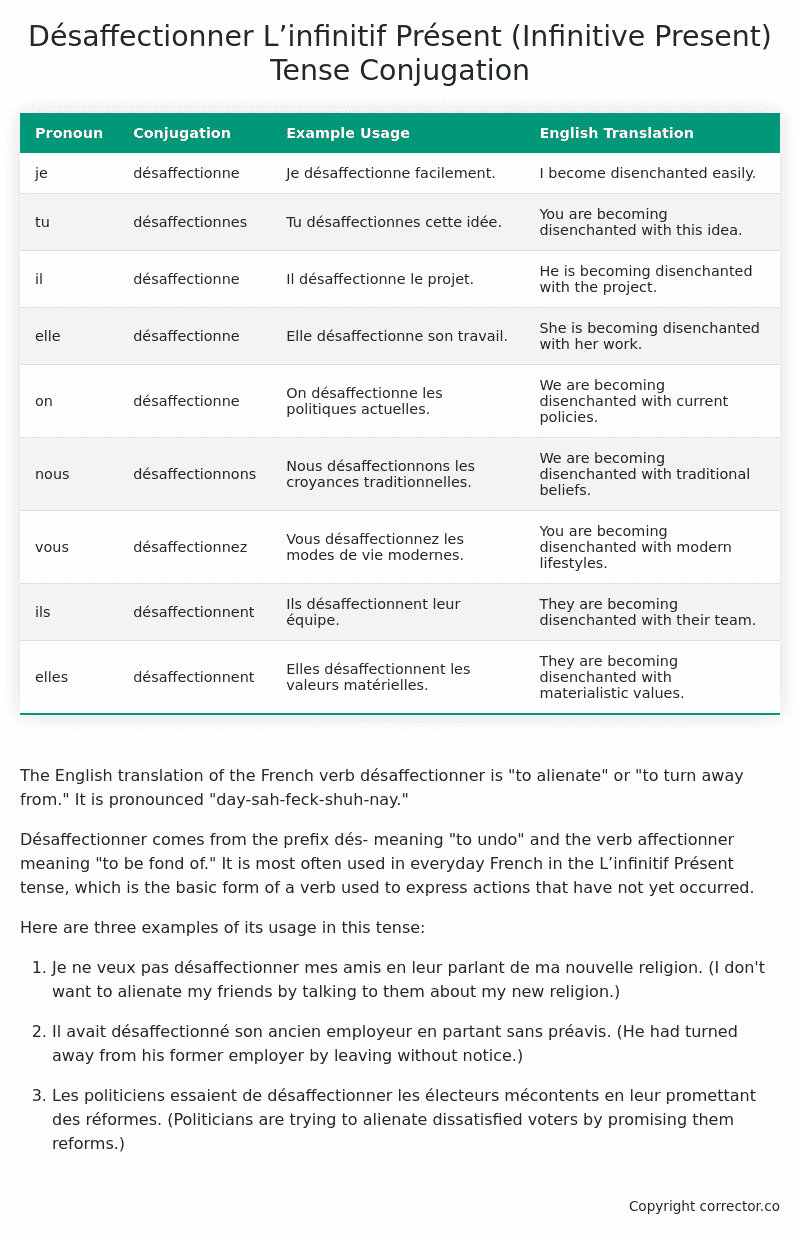L’infinitif Présent (Infinitive Present) Tense Conjugation of the French Verb désaffectionner
Introduction to the verb désaffectionner
The English translation of the French verb désaffectionner is “to alienate” or “to turn away from.” It is pronounced “day-sah-feck-shuh-nay.”
Désaffectionner comes from the prefix dés- meaning “to undo” and the verb affectionner meaning “to be fond of.” It is most often used in everyday French in the L’infinitif Présent tense, which is the basic form of a verb used to express actions that have not yet occurred.
Here are three examples of its usage in this tense:
-
Je ne veux pas désaffectionner mes amis en leur parlant de ma nouvelle religion. (I don’t want to alienate my friends by talking to them about my new religion.)
-
Il avait désaffectionné son ancien employeur en partant sans préavis. (He had turned away from his former employer by leaving without notice.)
-
Les politiciens essaient de désaffectionner les électeurs mécontents en leur promettant des réformes. (Politicians are trying to alienate dissatisfied voters by promising them reforms.)
Table of the L’infinitif Présent (Infinitive Present) Tense Conjugation of désaffectionner
| Pronoun | Conjugation | Example Usage | English Translation |
|---|---|---|---|
| je | désaffectionne | Je désaffectionne facilement. | I become disenchanted easily. |
| tu | désaffectionnes | Tu désaffectionnes cette idée. | You are becoming disenchanted with this idea. |
| il | désaffectionne | Il désaffectionne le projet. | He is becoming disenchanted with the project. |
| elle | désaffectionne | Elle désaffectionne son travail. | She is becoming disenchanted with her work. |
| on | désaffectionne | On désaffectionne les politiques actuelles. | We are becoming disenchanted with current policies. |
| nous | désaffectionnons | Nous désaffectionnons les croyances traditionnelles. | We are becoming disenchanted with traditional beliefs. |
| vous | désaffectionnez | Vous désaffectionnez les modes de vie modernes. | You are becoming disenchanted with modern lifestyles. |
| ils | désaffectionnent | Ils désaffectionnent leur équipe. | They are becoming disenchanted with their team. |
| elles | désaffectionnent | Elles désaffectionnent les valeurs matérielles. | They are becoming disenchanted with materialistic values. |
Other Conjugations for Désaffectionner.
Le Present (Present Tense) Conjugation of the French Verb désaffectionner
Imparfait (Imperfect) Tense Conjugation of the French Verb désaffectionner
Passé Simple (Simple Past) Tense Conjugation of the French Verb désaffectionner
Passé Composé (Present Perfect) Tense Conjugation of the French Verb désaffectionner
Futur Simple (Simple Future) Tense Conjugation of the French Verb désaffectionner
Futur Proche (Near Future) Tense Conjugation of the French Verb désaffectionner
Plus-que-parfait (Pluperfect) Tense Conjugation of the French Verb désaffectionner
Passé Antérieur (Past Anterior) Tense Conjugation of the French Verb désaffectionner
Futur Antérieur (Future Anterior) Tense Conjugation of the French Verb désaffectionner
Subjonctif Présent (Subjunctive Present) Tense Conjugation of the French Verb désaffectionner
Subjonctif Passé (Subjunctive Past) Tense Conjugation of the French Verb désaffectionner
Subjonctif Imparfait (Subjunctive Imperfect) Tense Conjugation of the French Verb désaffectionner
Conditionnel Présent (Conditional Present) Tense Conjugation of the French Verb désaffectionner
Conditionnel Passé (Conditional Past) Tense Conjugation of the French Verb désaffectionner
L’impératif Présent (Imperative Present) Tense Conjugation of the French Verb désaffectionner
L’infinitif Présent (Infinitive Present) Tense Conjugation of the French Verb désaffectionner (this article)
Struggling with French verbs or the language in general? Why not use our free French Grammar Checker – no registration required!
Get a FREE Download Study Sheet of this Conjugation 🔥
Simply right click the image below, click “save image” and get your free reference for the désaffectionner L’infinitif Présent tense conjugation!

Désaffectionner – About the French L’infinitif Présent (Infinitive Present) Tense
Forming the Infinitive Present
Common Everyday Usage Patterns
As a Verb’s Dictionary Form
After Modal Verbs
As an Imperative
In Infinitive Clauses
Interactions with Other Tenses
Present Tense
Future Tense
Conditional Tense
Passé Composé
Imperfect Tense
Subjunctive and Conditional Moods
Summary
Want More?
I hope you enjoyed this article on the verb désaffectionner. Still in a learning mood? Check out another TOTALLY random French verb conjugation!


